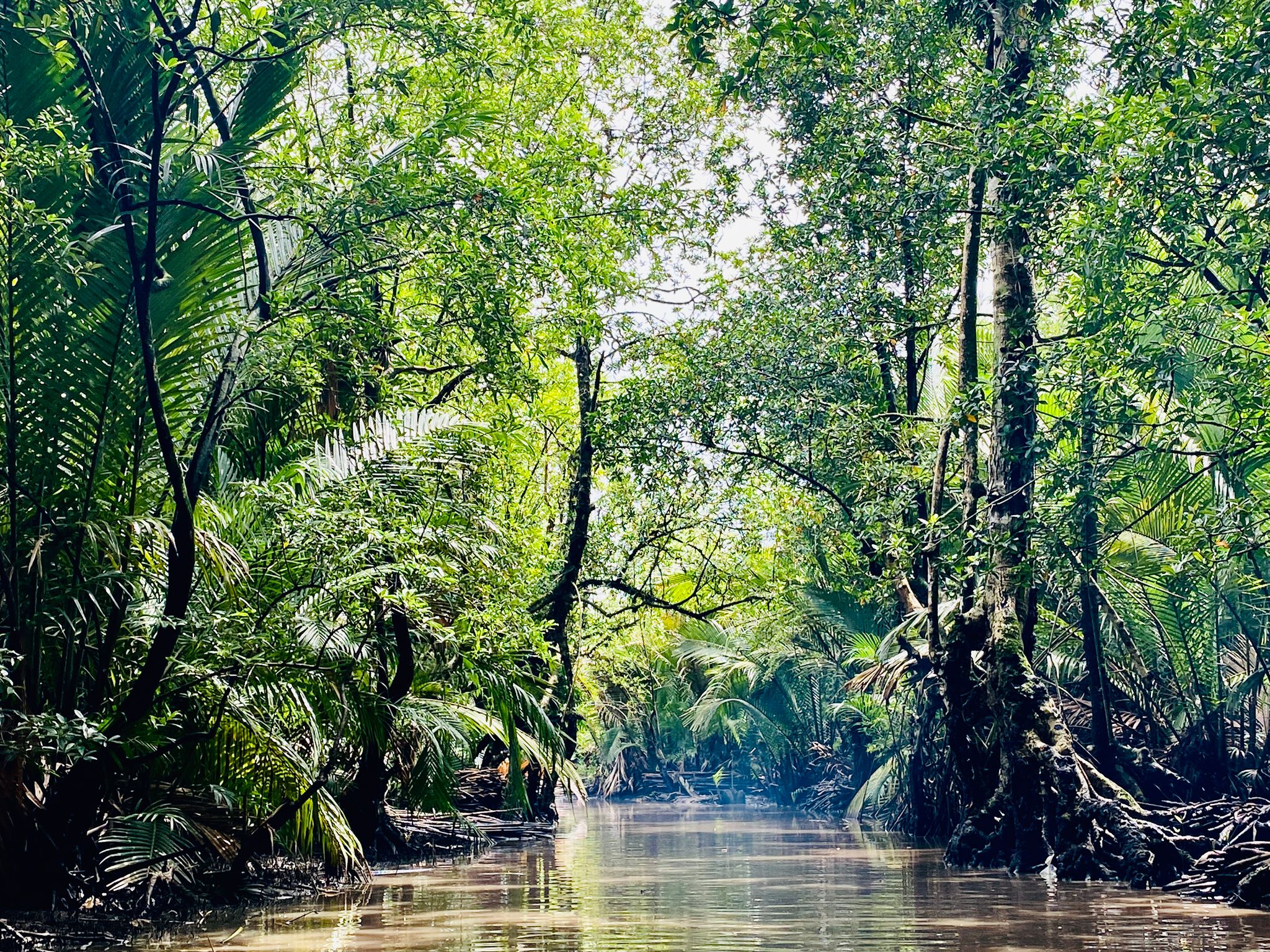
Our actions for climate
Climate change is now a tangible reality for everyone.
Rising global temperatures and the acceleration of extreme weather events are already starting to impact natural ecosystems and human well-being, with strains on food capacities and the health of women and men in some regions of the globe. However, the climate is extremely dependent on the level of greenhouse gases stored in the atmosphere – primarily CO2. In this context, forests are particularly useful for removing CO2 from the atmosphere and storing it on earth.
Acting for forests is therefore a major lever of action for the climate to which the Planète Urgence association is fully committed.
How does the climate work?
Before explaining how the association can act for climate protection, let’s start by explaining how the climate system works.
Climate, as defined by the World Meteorological Organization (WMO), is “the synthesis of weather conditions in a given region, characterized by long-term statistics of variables in the state of the atmosphere.” The climate is therefore a result of all the interactions that take place between the sun, the land, the oceans, the winds, the vegetation, the atmosphere …
The key element in global climate regulation is the greenhouse effect. Put simply, the greenhouse effect is a layer made up of different gases – the famous greenhouse gases, such as carbon dioxide (CO2), methane (CH4) or nitrous oxide (N2O) – which retains the heat of the sun on earth. This phenomenon resembles what happens in a greenhouse where vegetables are grown there when it is still cool outside: the transparent walls of the greenhouse allow the sun’s rays to pass through, but the glass slows down the heat output.
The greenhouse effect is a natural phenomenon and essential to life on Earth since without the greenhouse effect, the planet would be 33 ° C colder!
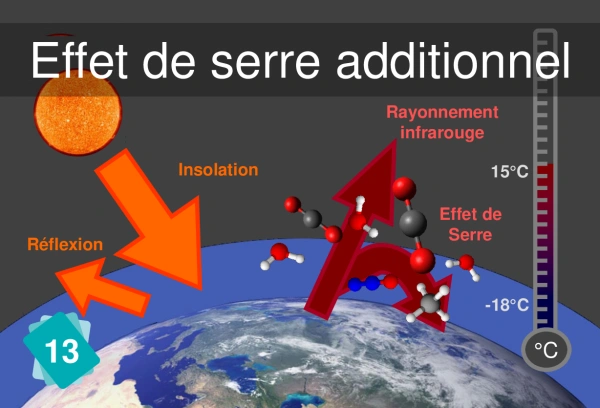
Source: Map 13 of the Fresque du Climat, explaining the greenhouse effect
Why are we talking about climate change?
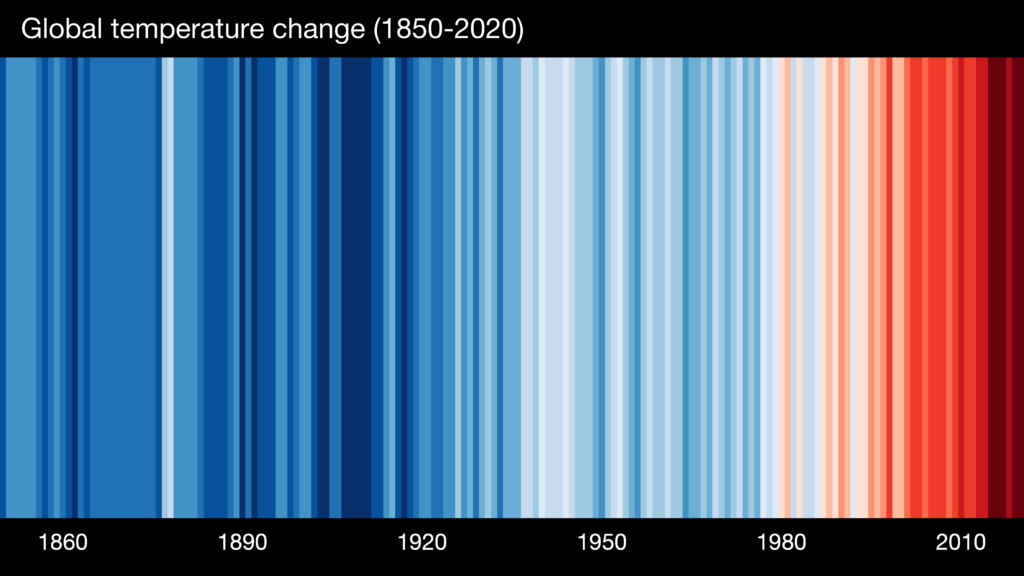
Source: Ed Hawkings’ climate tapes (IPCC), https://showyourstripes.info/
The behaviour of the entire climate system is influenced by the evolution of certain external parameters that act on the greenhouse effect, which can be natural mechanisms such as a volcanic eruption or mechanisms linked to human activities. However, these human activities – and in particular the combustion of fossil fuels and deforestation – have greatly increased over the last decades. The oceans and forests can absorb some of these greenhouse gases, which is why they are called “carbon sinks”, but this capacity is now only 56%, the rest of the gases therefore remain in the atmosphere increasing the natural greenhouse effect which warms the climate.
The air temperature on the ground has already increased by nearly 1.2 ° C on average since 1900. According to the scenarios, it will have increased from 2.7 ° C to 7 ° C by 2100. Let us remember that 5 ° difference in temperature separates us from today’s last ice age …
What is the link between climate and forest preservation?
Planète Urgence has been preserving and restoring the world’s forests since 2007 and therefore plays a climate change mitigation role at 2 levels.
Forests represent the second largest carbon sink in the world after the oceans.
In fact, to feed and grow, a tree captures carbon dioxide in its leaves and bark, light through its leaves and water through its roots. .
It then transforms its 3 elements during the process of photosynthesis, which allows it to produce sap and oxygen which it releases into the atmosphere.
A forest is therefore an essential lever for action in favour of global carbon sinks.

What is Planète Urgence’s action on the climate beyond the preservation of forests?
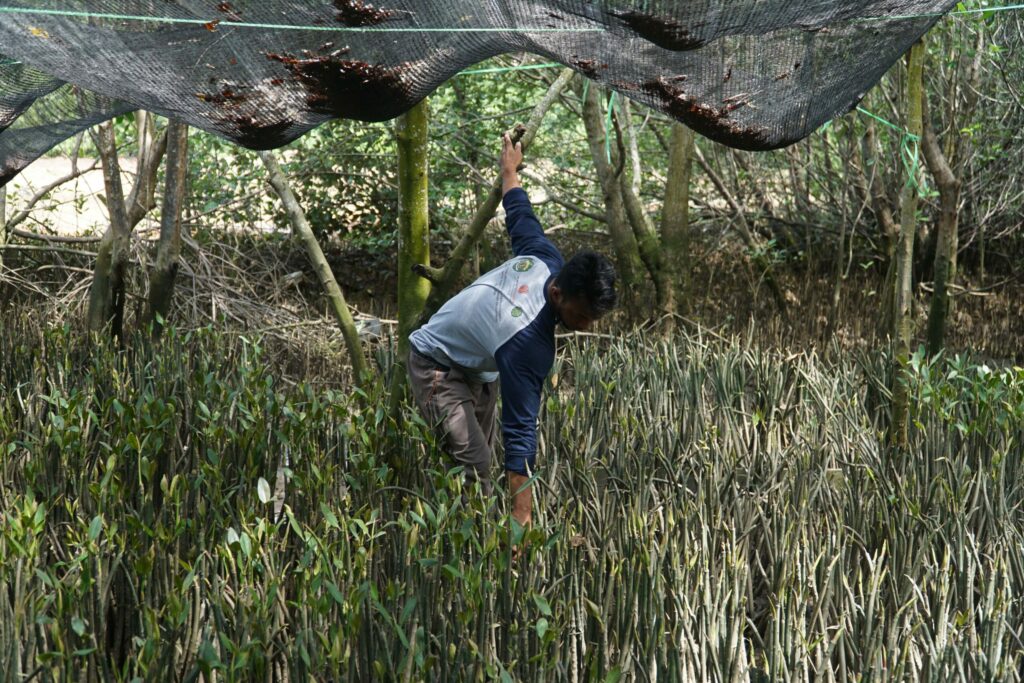
Unfortunately, the 2 ° C warming target has been achieved, Planète Urgence is helping territories and inhabitants to adapt to these present and future changes. The Intergovernmental Panel on Climate Change, the IPCC, has clarified the risks associated with rising temperatures: droughts, floods, submersions, etc. Each Planète Urgence intervention must therefore include an analysis of these risks and a response adapted.
One of the actions of the association is the planting of mangroves along the most vulnerable coasts in order to protect the coastal villages from submersion.
Another action is also essential in the eyes of the association: raising awareness and mobilizing all stakeholders on climate change.
Indeed, we are convinced that the necessary movement in favour of changing practices will only be possible by explaining the origins and consequences of climate change, and its link to humans and biodiversity.
The association has therefore set up projects in its countries of operation, but also in France, aimed at raising awareness of these issues, young and old. In particular, in 2021, it initiated the Planète Éducation project in schools in Benin to train teachers on forests, climate and biodiversity.
Planète Urgence therefore wishes to have an integrated and increasingly impactful approach to climate issues by working on the reduction of emissions, sequestration through the increase of global carbon sinks, and the adaptation and mobilization of populations
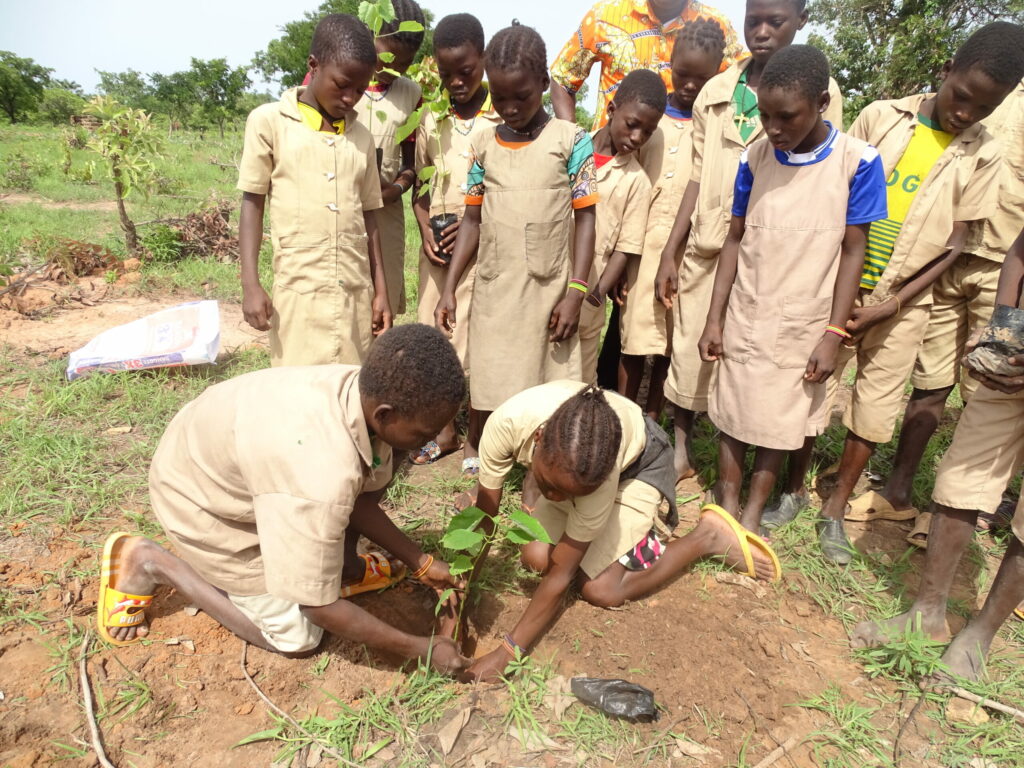
The 4 key principles of Planète Urgence in terms of climate finance
Planète Urgence has many requests for carbon offsets from companies and wishes to share 4 key principles that must guide all financing of projects in line with climate issues. The association thus wishes to offer constructive criticism so that the research of the impact promotes on all other financial considerations
Above all, reduce its emissions
The idea of neutrality only makes sense at the level of the planet and not of an organization. The priority of an organization must be above all to measure and commit to a path of reducing its extremely demanding emissions and consistent with the Paris agreements. An organization must therefore strive to drastically reduce its direct and indirect greenhouse gas emissions and it must also be proactive to avoid all the emissions caused by its activity.

Contribute rather than compensate
Organizations can contribute as much as possible to the effort to preserve global carbon sinks, in and out of value chains in parallel with reducing emissions. The term of compensation is overused, because it would be wrong to think that what was issued during one year could be compensated over 30 years – in particular within the framework of forestry projects. Carbon credits sold on the voluntary market represent a useful but insufficient financing tool, because they do not finance all projects having an impact on the climate and the low prices charged often do not guarantee quality projects. Sponsorship for forestry projects can be an interesting alternative to help protect and restore global carbon sinks.
Act on mitigation and adaptation, as a priority in the most vulnerable countries
Climate change is the consequence of the mode of production and consumption of the richest countries, and those who will pay the heaviest consequences are the inhabitants of the poorest countries. It therefore seems important to us to ensure that we pay particular attention to the financing of projects intended for countries in the South to help them better manage the impacts of climate change and adapt to it.
Only finance projects linking climate, biodiversity and the fight against inequalities
Forests are at the edge of biodiversity issues (they are home to 80% of the world’s biodiversity, IPBES 2019) and humans (250 million people in extreme poverty live within 5km of a forest, FAO 2020). It is therefore essential to ensure that projects aiming at an impact on the climate systematically integrate the challenges of biodiversity and the fight against inequalities, this is a guarantee for the sustainability of the impact.
To go further on climate
- Do a “Fresque du climat” : https://fresqueduclimat.org/
- Read Jean Marc Jancovici’s book “Le changement climatique expliqué à ma fille”, https://jancovici.com/publications-et-co/livres/le-changement-climatique-explique-a-ma-fille/
- Shift Project analysis https://theshiftproject.org/
- Follow Juliette Nouel on Linkedin
- The GIEC latest report : https://bonpote.com/synthese-et-analyse-du-nouveau-rapport-du-giec/
- Read the Géo article on the UN’s latest report on climate engagements https://www.geo.fr/environnement/le-monde-sur-un-chemin-catastrophique-vers-un-rechauffement-de-2-7degc-206316
Sources :
- Groupe d’Experts Intergouvernemental sur l’Évolution du Climat (GIEC), rapports 2018 et 2021
- Organisations des Nations Unies, étude septembre 2021
Article révisé par Renaud Bettin, membre du comité d’Orientation de Planète Urgence et expert Climat
Contact us
If you are a company and want to commit to the preservation of forests and biodiversity in favor of the climate, contact partenariat@planete-urgence.org.
If you are a journalist and would like to know more about Planète Urgence’s position on the climate or interview our teams in the field, contact lea.cousin@planete-urgence.org.


